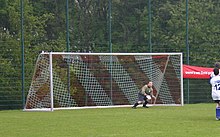Goal (soccer)
The goal is an element of the football field , the playing field in a football game . A soccer field has a goal for each team. It is the primary goal of the two teams to shoot the ball into the opposing goal ("to score a goal") - the team that has scored the most goals at the end of the game wins the game.
Regulations
The goals of a soccer field must be in the middle of the respective goal line . They consist of two vertical posts that are equidistant from the corner flags and are connected at the top by a crossbar.
The distance between the inner edges of the posts is 7.32 m, the bottom edge of the crossbar is 2.44 m from the ground (8 feet × 8 yards , this corresponds to the ratio 1: 3). The posts and the crossbar must not be more than 12 cm wide and deep. They must all be in the same format. The goal line must be the same width as the post and crossbar. The posts and crossbars must be white, although a silver-metallic color is also permitted in Germany.
A goal net is usually attached to each goal. This is located behind the goal and is attached to the posts, the crossbar and the floor. They should be supported in a suitable manner and attached in such a way that the goalkeeper has enough leeway. The net is used to make it easier for the referee and everyone involved to see whether a shot was shot in or near the goal. Wrong decisions as a result of a wrong perception by the referee are called " phantom goals " and represent a rare but very serious mistake by the referee.
Normalization
- The exact dimensions and designs can be found in DIN 7900 playing field equipment - football goals - construction dimensions .
- In Europe, the goals are tested in accordance with EN 748 football goals - functional and safety requirements, test methods .
Deviations in dimensions
For games on smaller playing fields (e.g. on only one half of the playing field or on the "shortened large field"), as is common in the youth sector in particular, correspondingly smaller goals are used. A common dimension for goals when playing on only one half of the pitch is 5 meters wide and 2 meters high.
Indoor soccer is usually played with handball goals or also with 5 × 2 meter goals.
Variant of the mesh covering
- Variants of the net covering: soccer goals
In the German Bundesliga , games are played exclusively with the "free net suspension". This means that the net is not attached to a bracket, but to two steel bars that are located just behind the goal. In the lower divisions , goals are usually played with net hangers attached to brackets.
Trivia
- In Nottingham (England), a football goal with a net covering was used for the first time in 1891.
- When the Bökelberg post broke on April 3, 1971, the post of a wooden goal broke during the Bundesliga game Borussia Mönchengladbach against Werder Bremen. The game was canceled. As a result, all Bundesliga goals were switched to aluminum.
- During a Bundesliga match on September 20, 1989 , Ditmar Jakobs got caught on a defective snap hook on a goal hanger. He was seriously injured in the process. Since then, all forms of snap hooks and steel nails have been banned.
- On April 1, 1998, the " Torfall von Madrid " led to a 76-minute delay between Real Madrid and Borussia Dortmund . The bridging commentary on the repair work by reporters Günther Jauch and Marcel Reif was seen by 12 million viewers; only about 6 million saw the game itself. The commentators received the Bavarian TV Prize for their performance (Jauch: "The first goal was scored here in the zeroth minute!" / Reif: "Never before would a goal have done a game as good as it is here today, an early goal.") .
- In the group game of the Africa Cup of Nations 2013 between Algeria and Togo on January 26, 2013, a post of the Togolese goal buckled because the Algerian Adlène Guédioura ran into the goal net. Then this was exchanged and provided an injury time of 13 minutes.
- In Austria goal posts are often referred to as “poles”.
Web links
- Football rules of the DFB , season 2019/2020 (PDF file).
- Shiriwiki: Requirements for goals and goal nets
Individual evidence
- ↑ Sven Flohr: Marcel Reif: "Günther Jauch saved me from media suicide". Welt Online , April 1, 2020, accessed April 25, 2020 .
- ↑ Africa Cup: Togo defeated Algeria 2-0 in Group D. In: Sportal.de. January 26, 2014, accessed July 4, 2014 .


